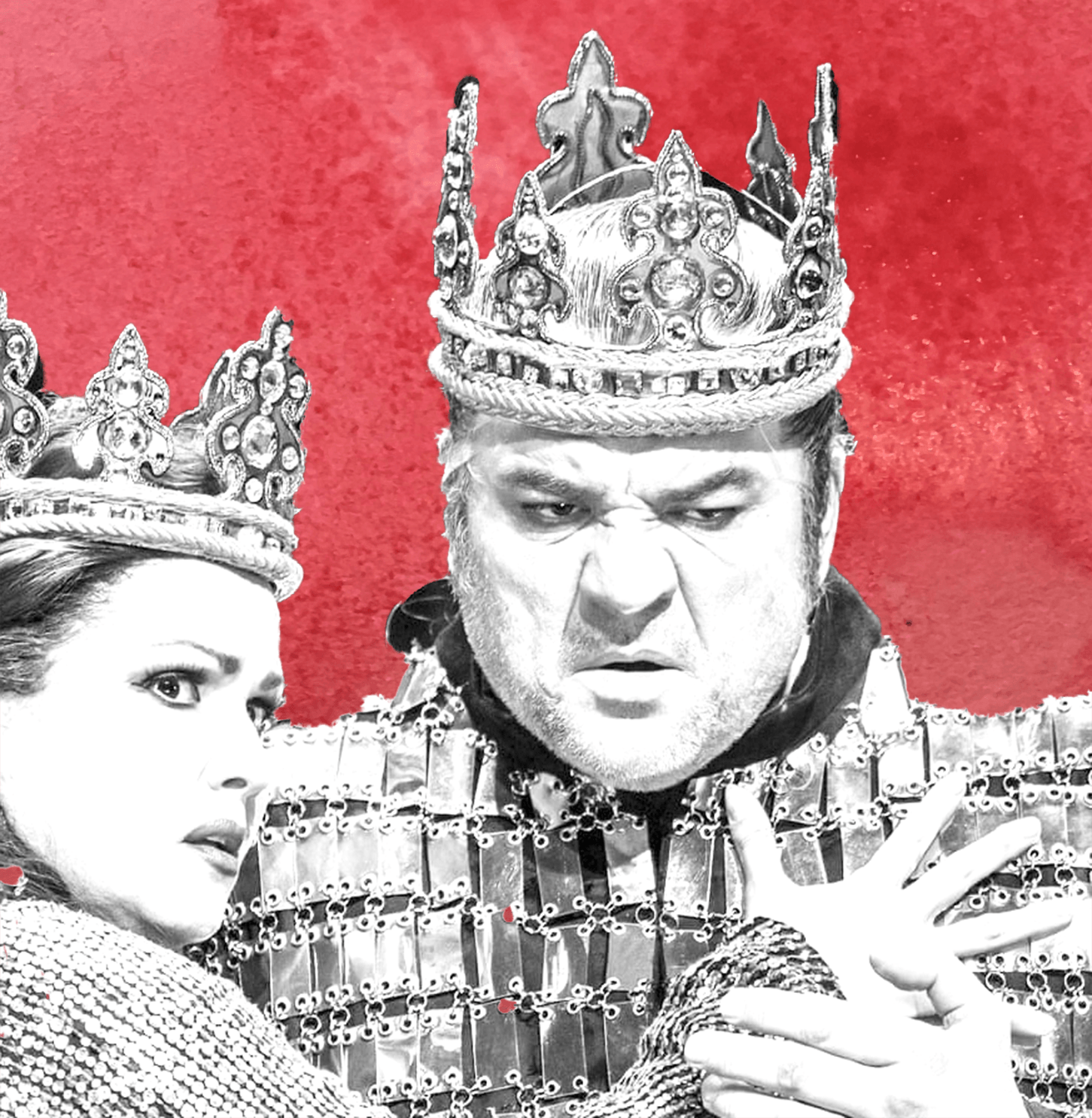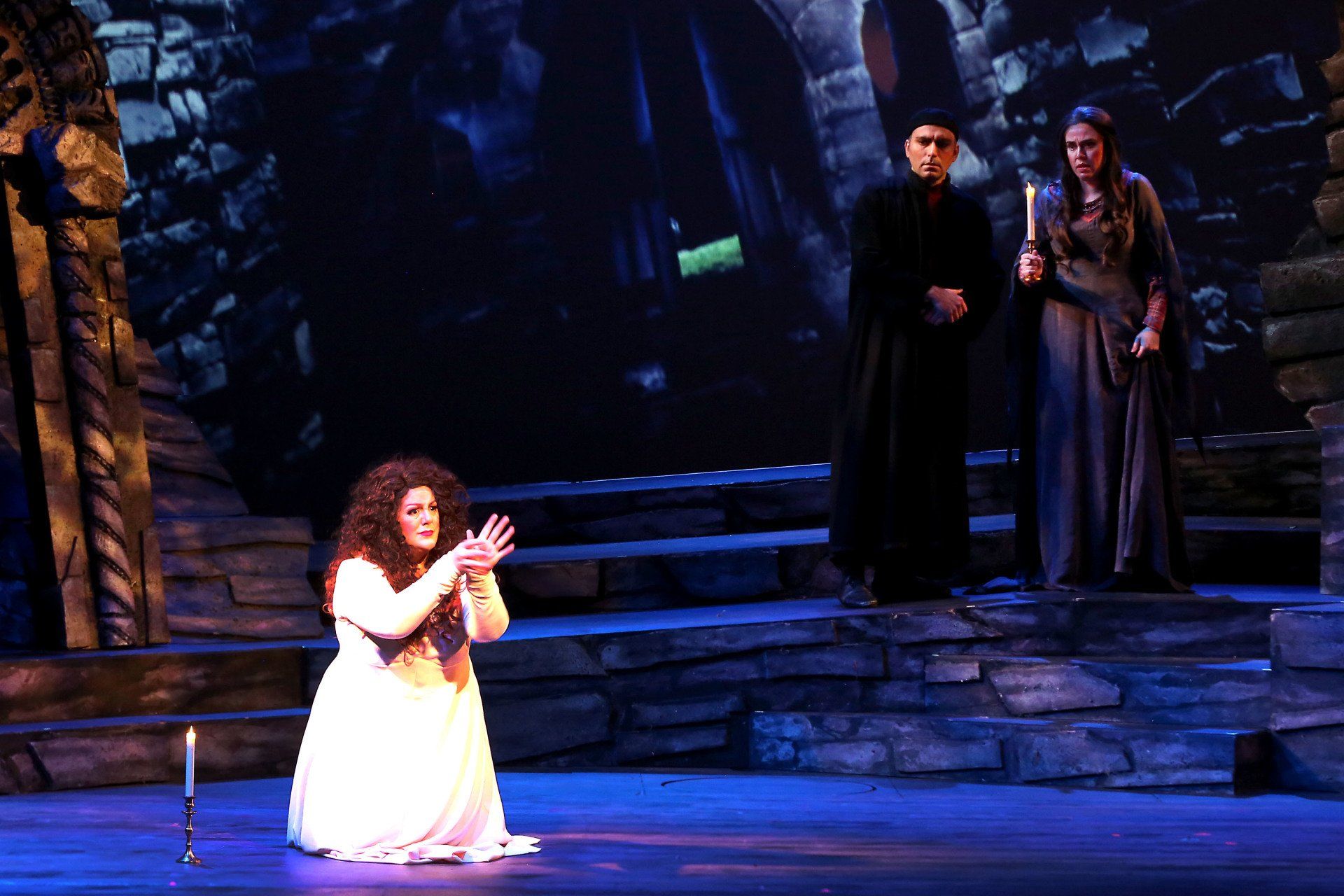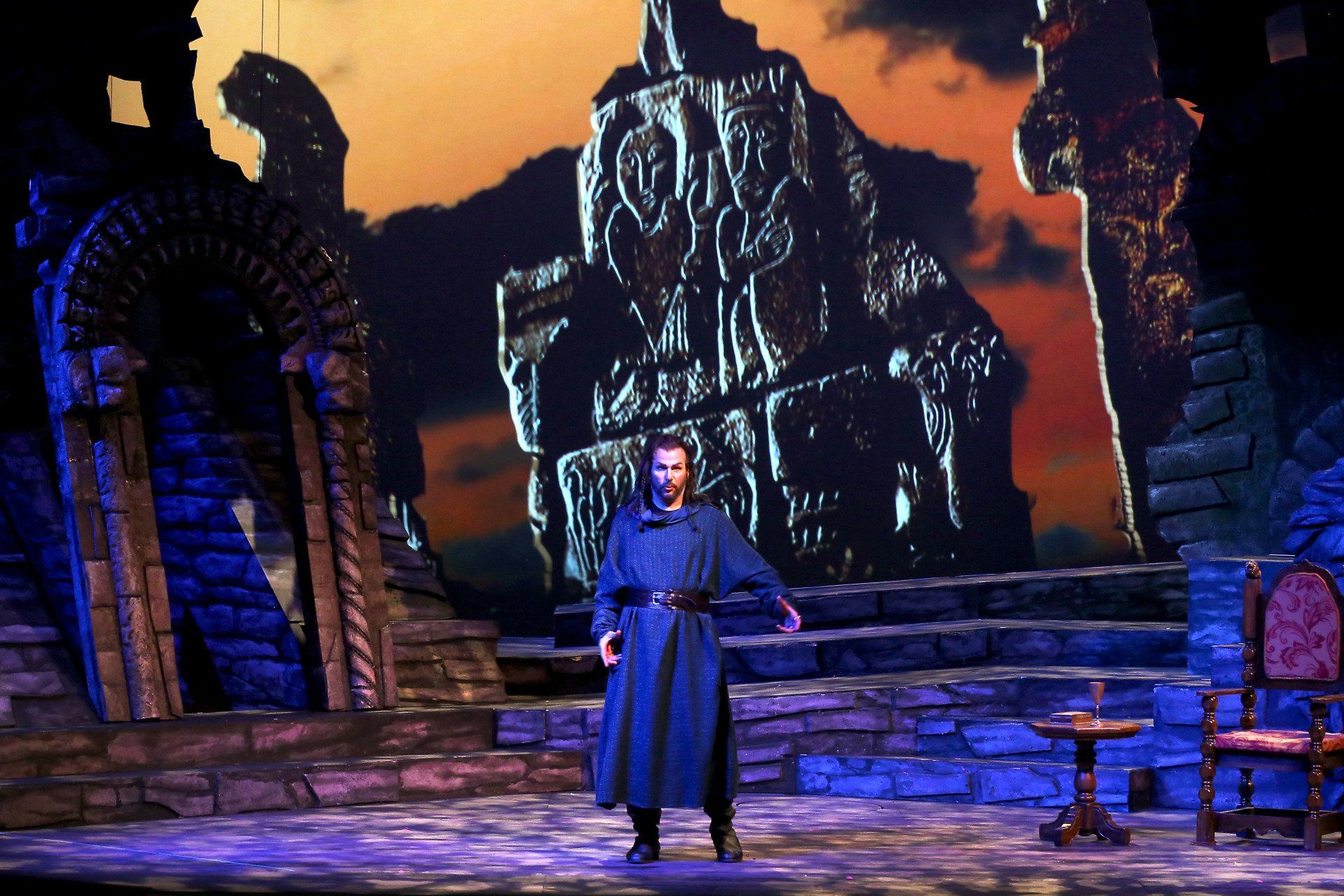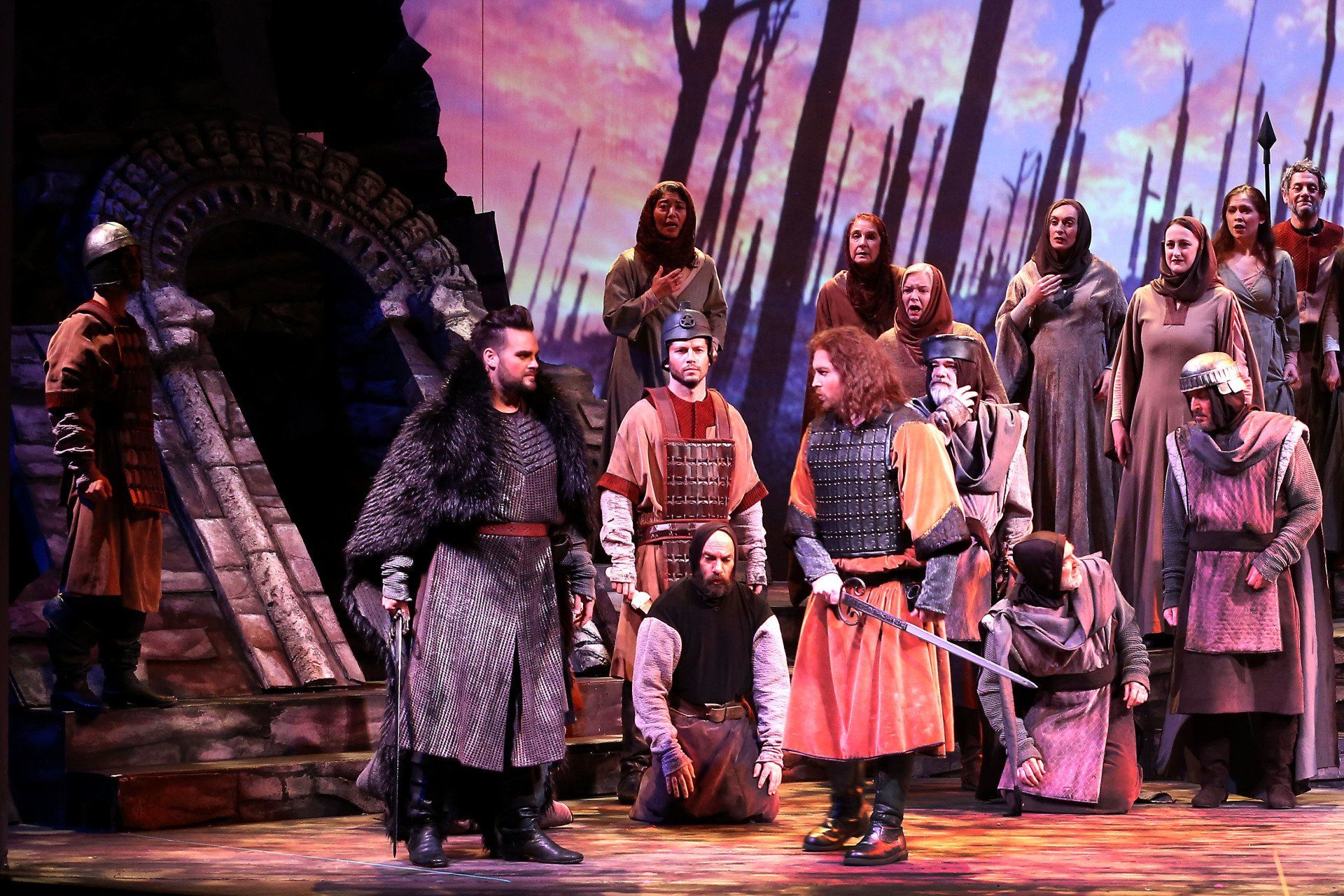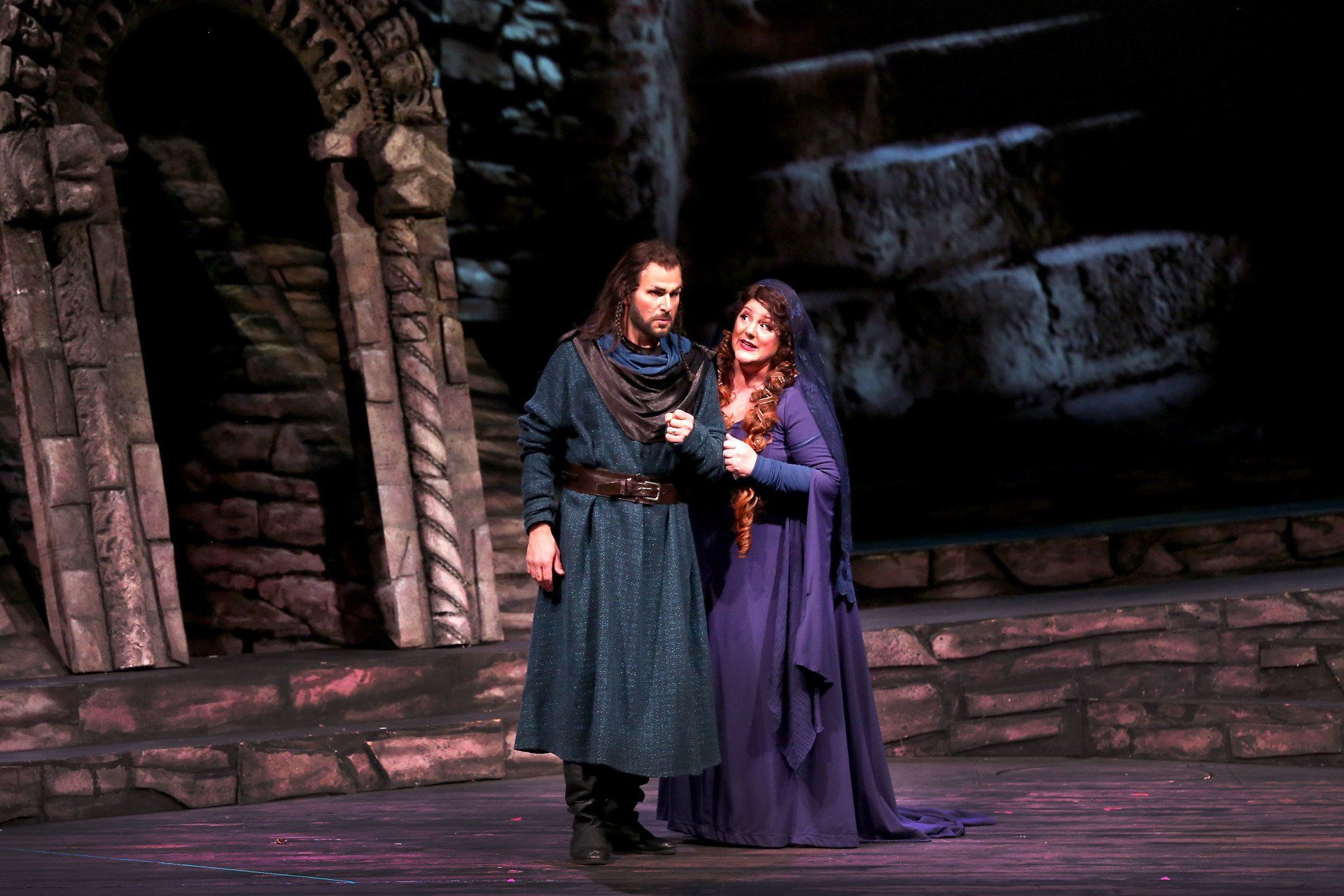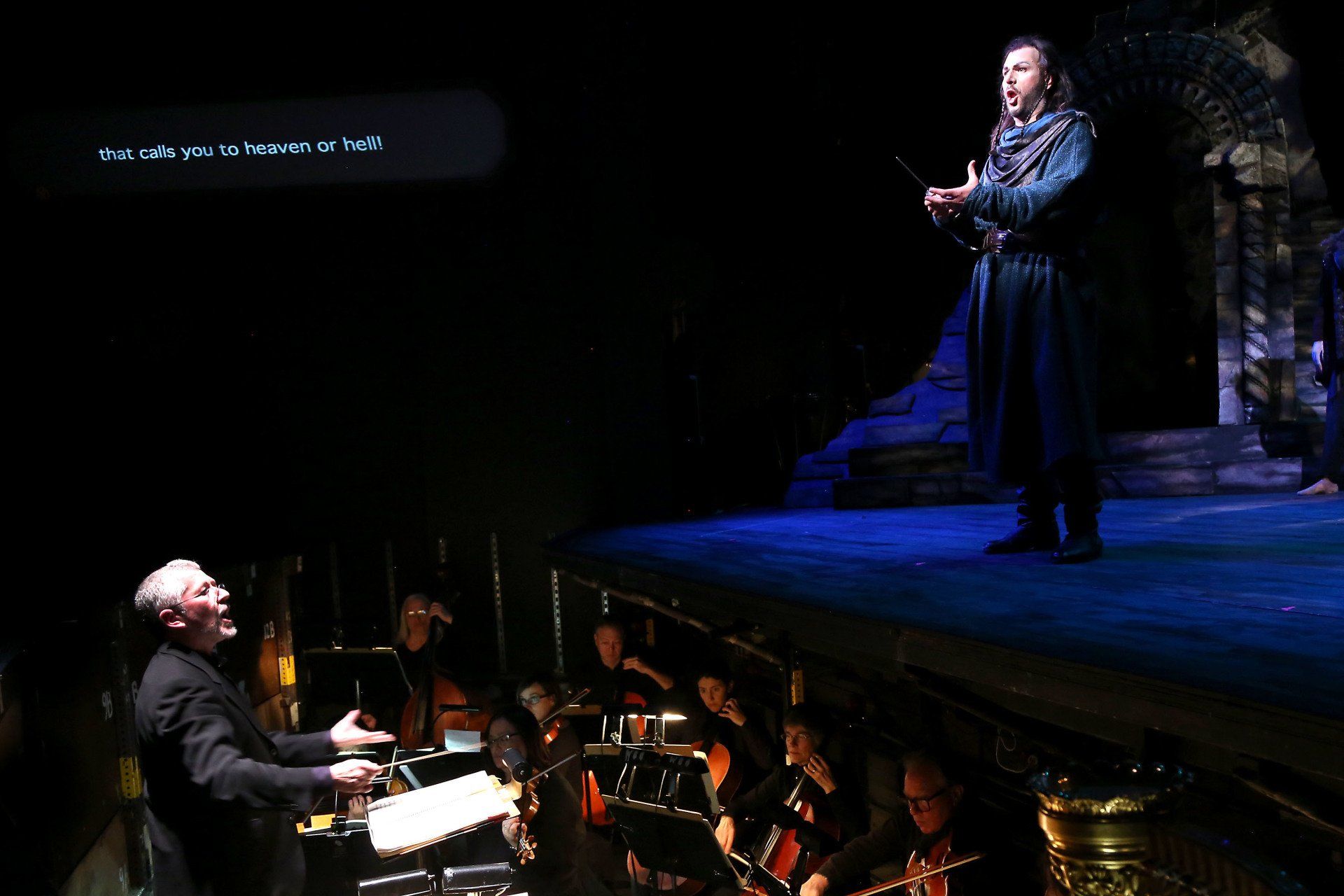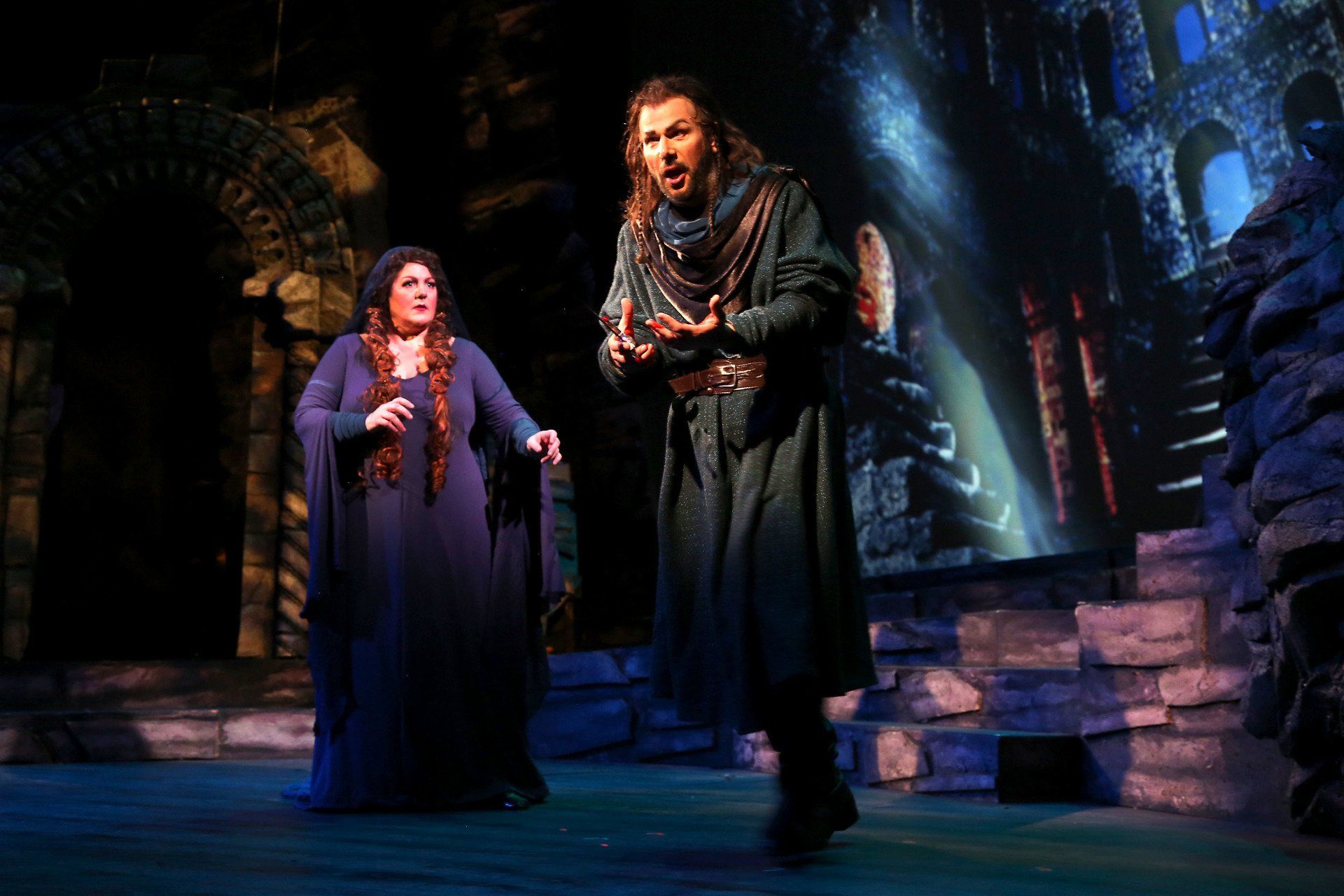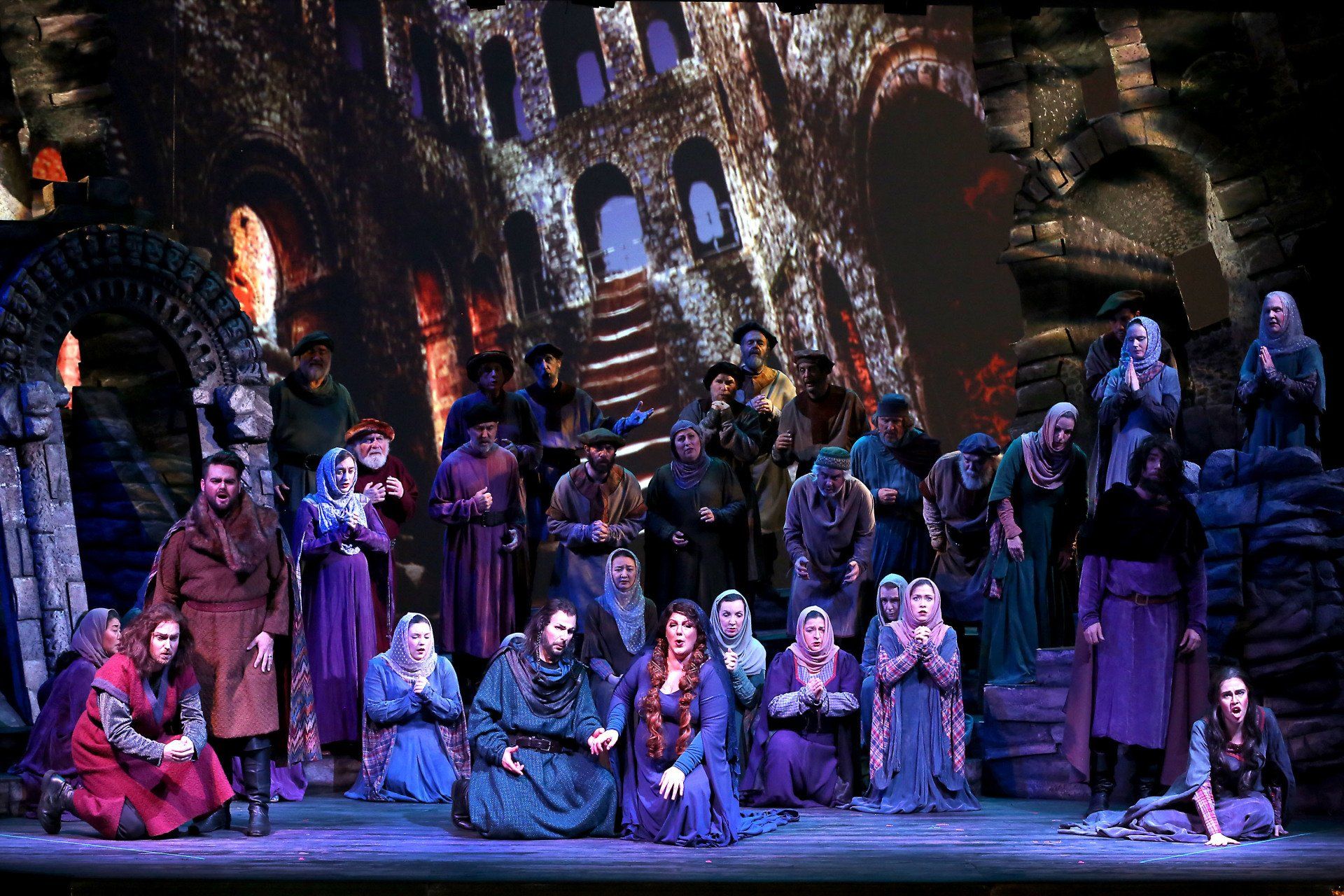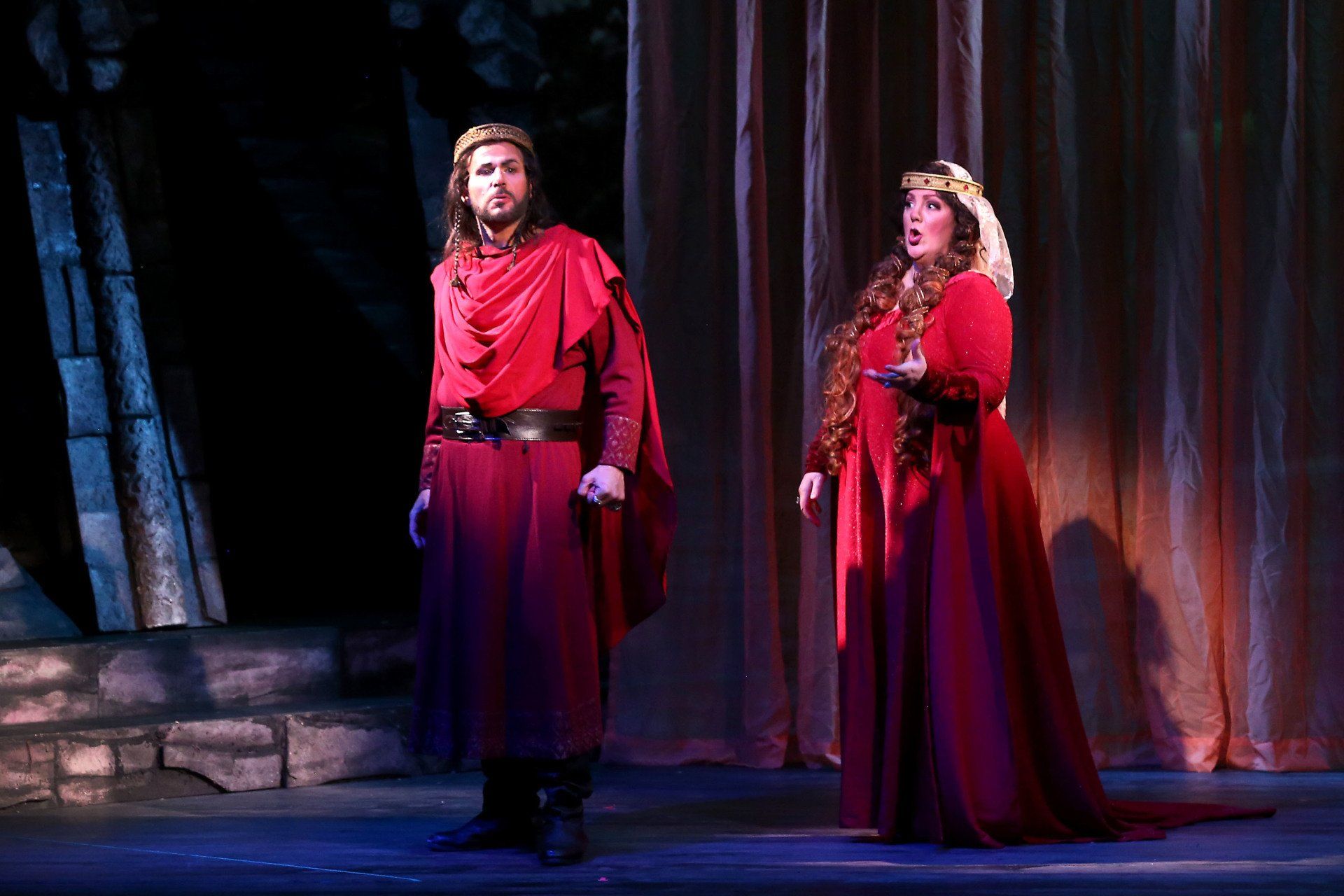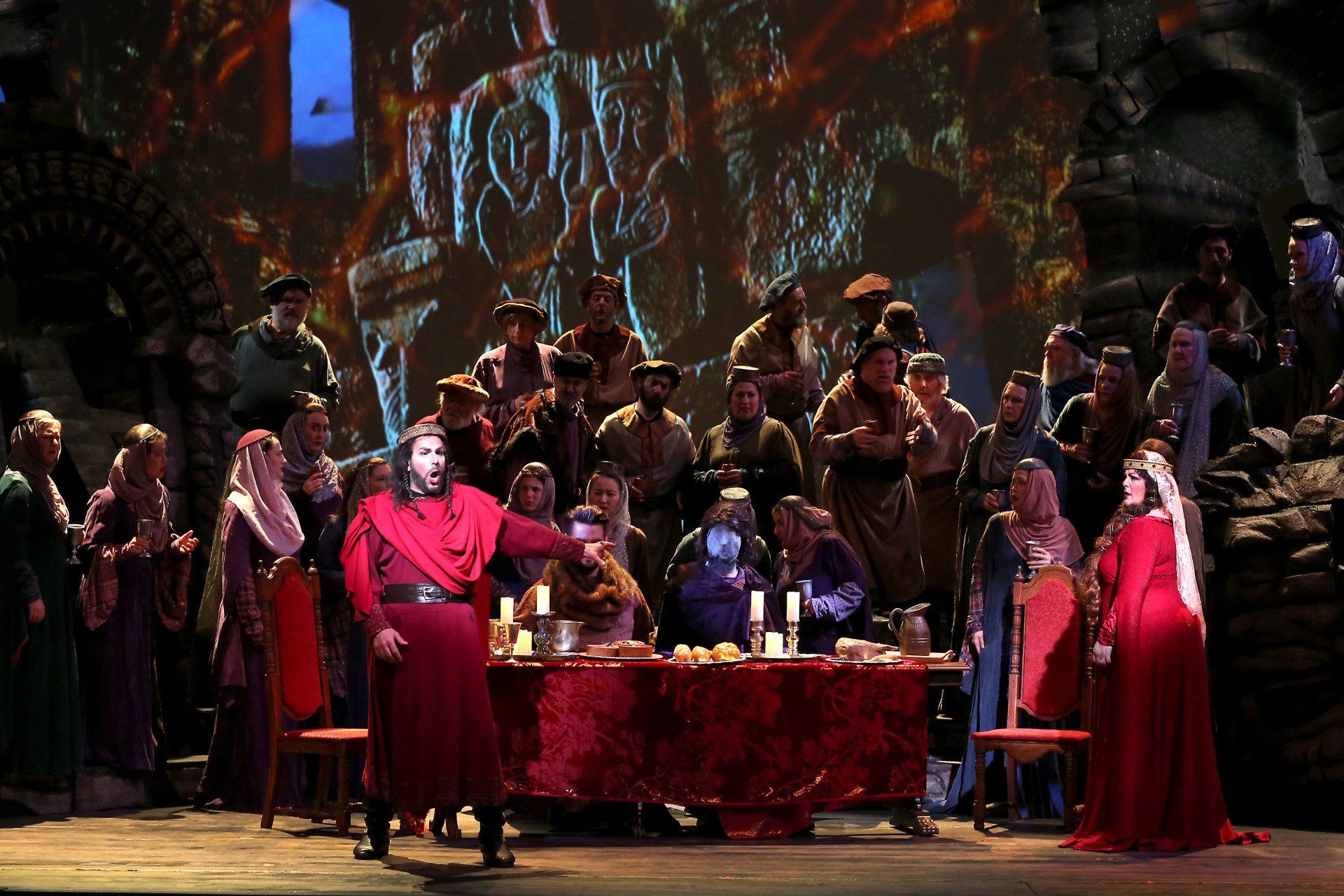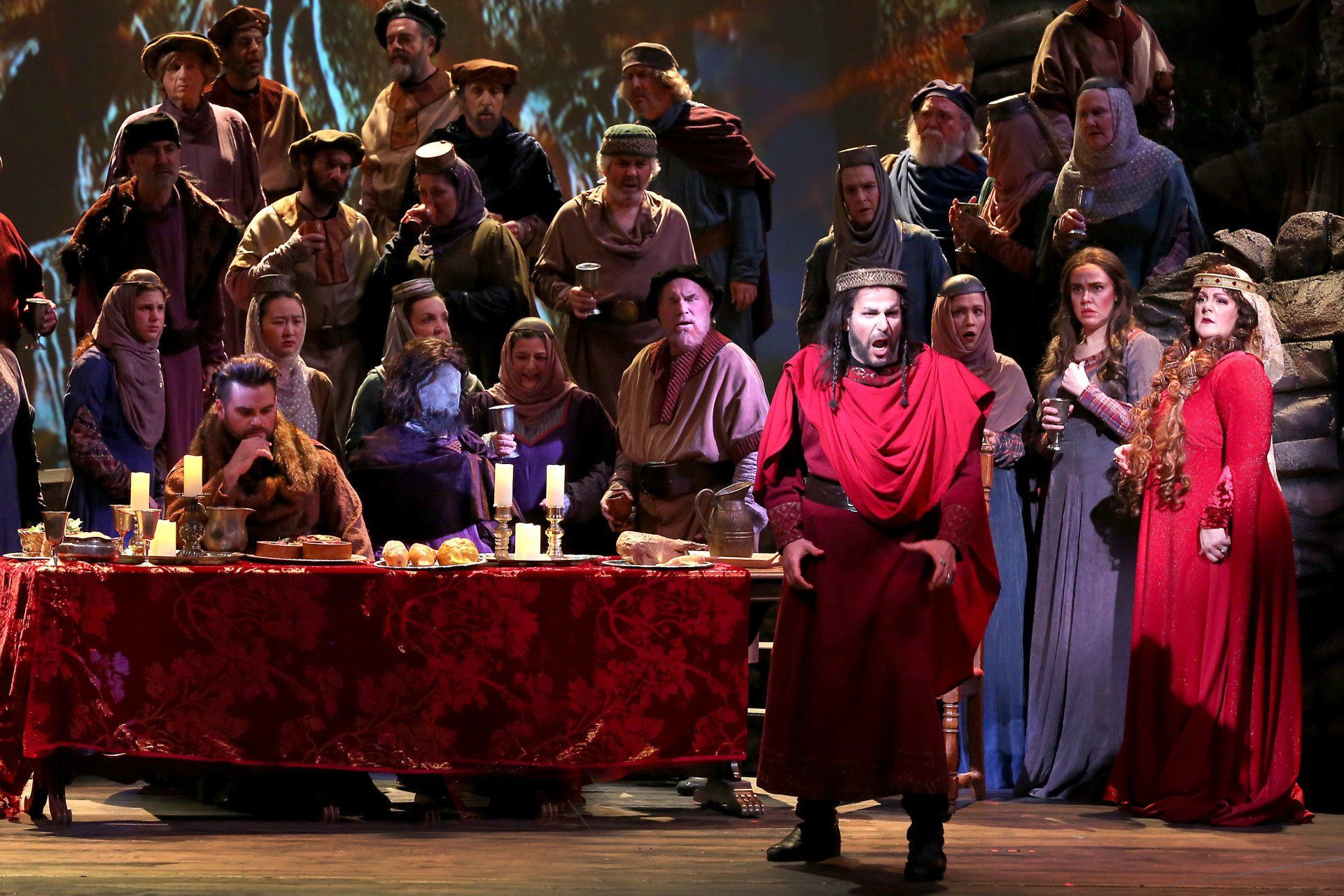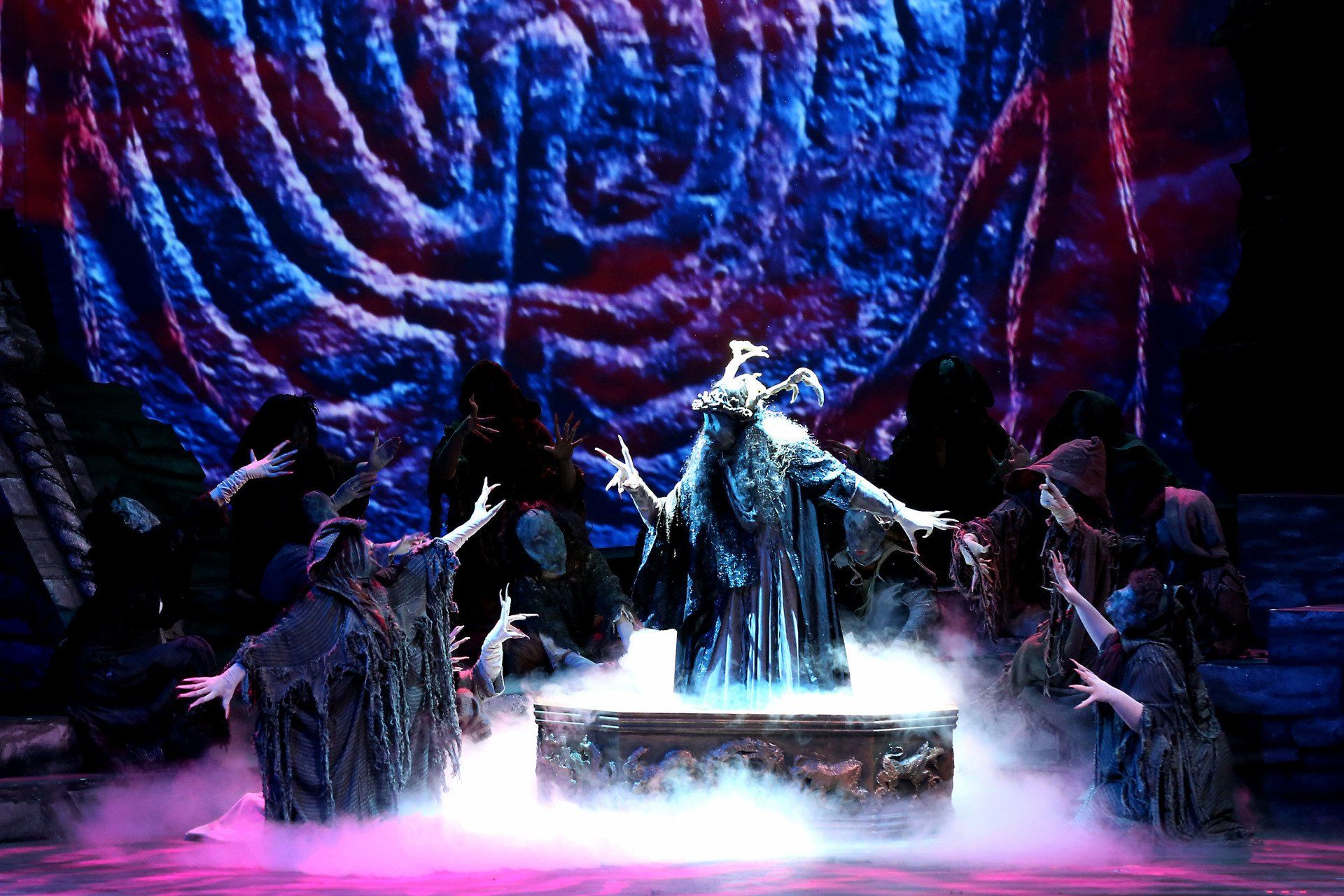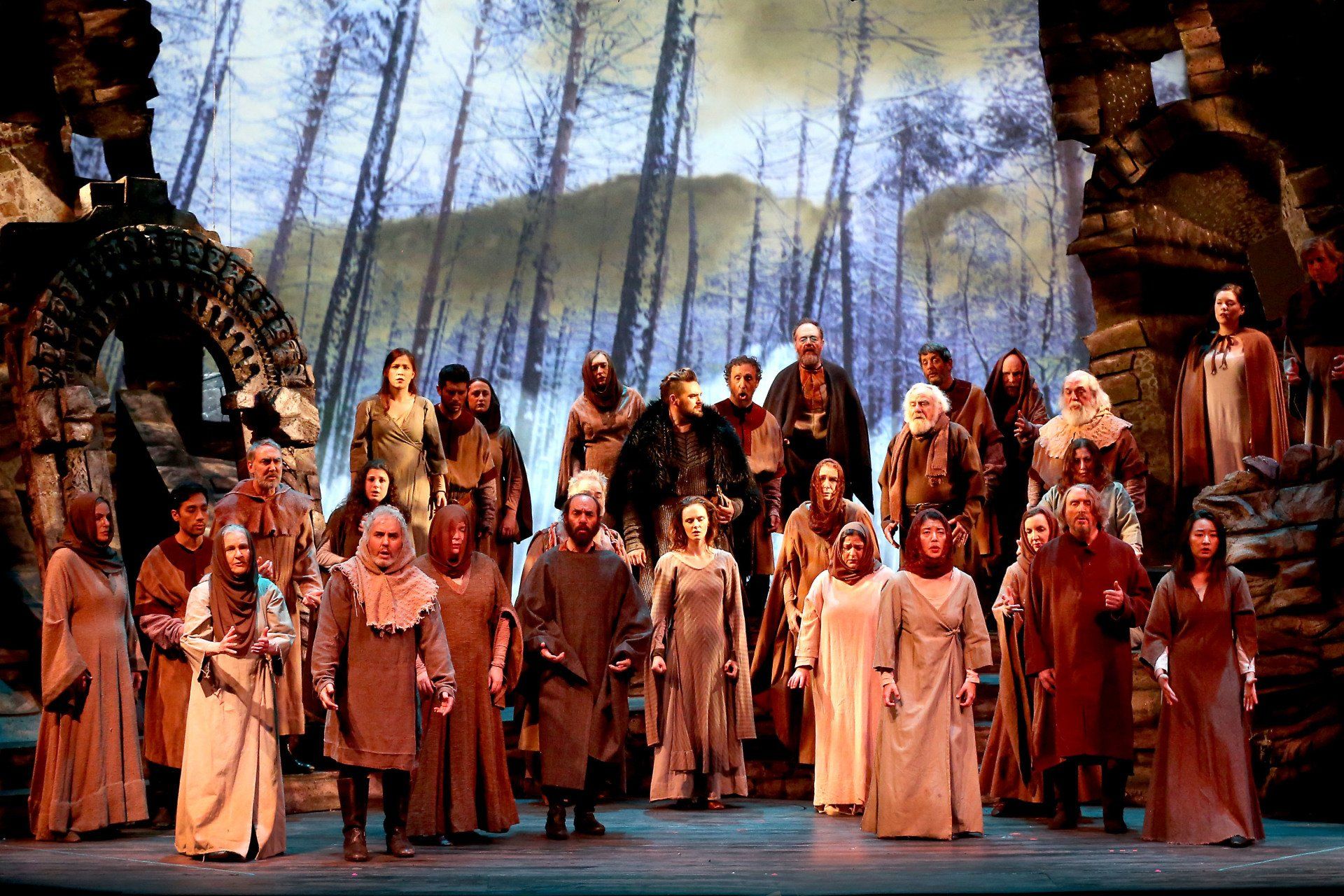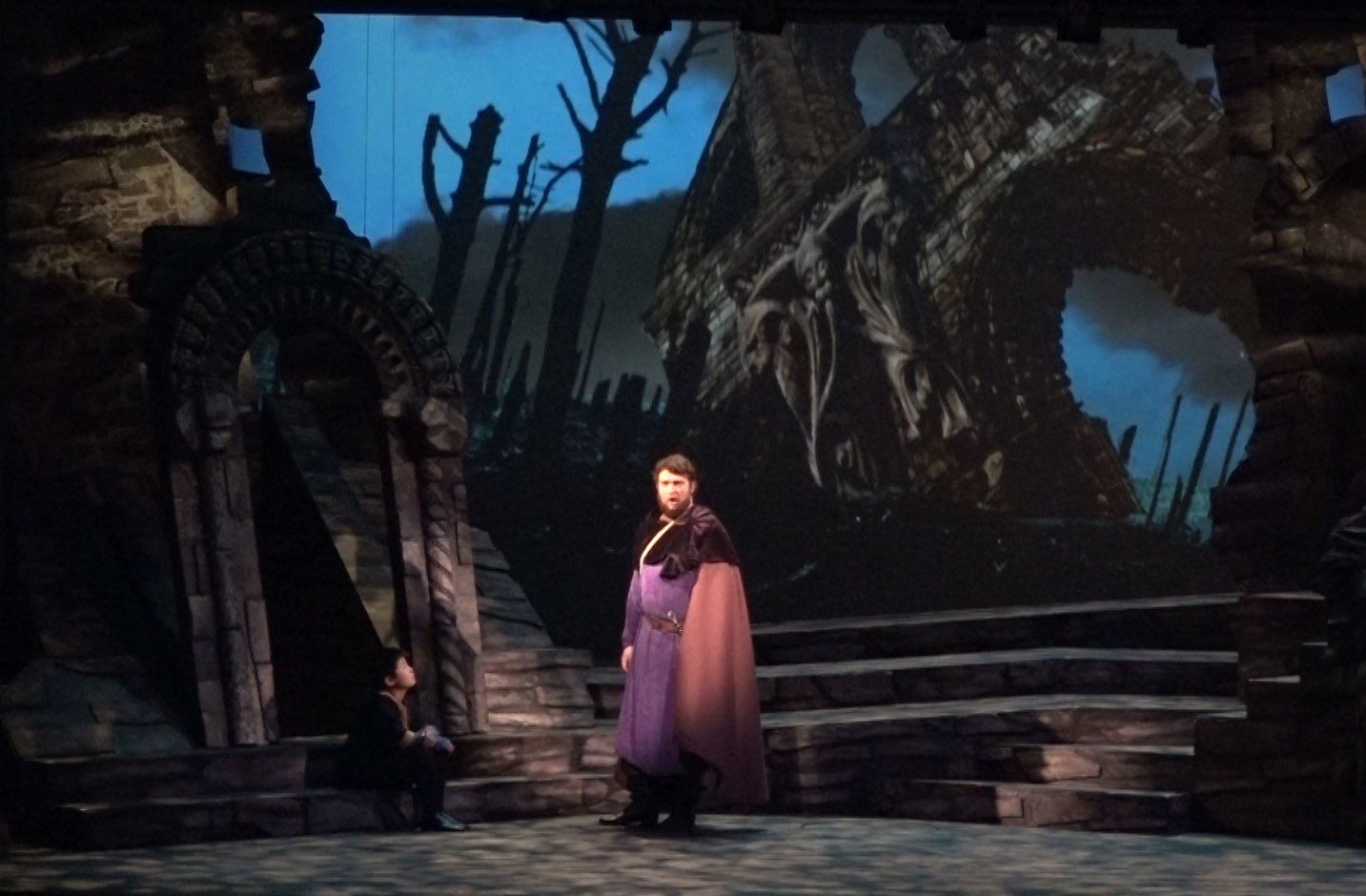Macbeth
February 15, 2020 by Eddie Reynolds
Woodwinds creep together in soft, low measures before intertwining in higher registers and giving way to announcing brass that awaken spirits from the underworld. Those dark figures manipulate wood puppets to tell the agonized history of a royal, childless marriage. From foggy mists, faceless sisters of the night emerge in every sort of torn and draped rag, roving about while singing in high, otherworldly voices about dire deeds done like the drowning of some husband set off in his ship – each of the many singing what “I” did in bragging of the disaster. As bodies twirl and swirl madly – their six-inch, deathly white fingernails flashing in the moon light – a drum announces two approaching receptors for their next set of damning prophecies, the recently victorious generals Macbeth and Banquo.
Already Stage Director Ragnar Conde has established the eerie, near terrifying presence of his stage full of weird sisters – witches who have no facial features but who still show their obvious delight in producing death and chaos among the mortals. The mood has been set for a tale that is blood-curdling in nature but with a magnetic draw to behold all its gory details.
Conductor José Luis Moscovich has also already established that the thirty-person orchestra of this West Bay Opera production of Giuseppe Verdi’s Macbeth will once again live up to the company’s reputation of a magnificently played score that can rival the orchestras of venues many times the size of Palo Alto’s intimate Lucie Stern Theatre.
And as the evening proceeds through its three hours of four acts (with two intermissions), a cast of impressive-to-astounding principals and a well-voiced chorus of near thirty will ensure that the sold-out audience will leave having enjoyed another evening of inspiring opera by this, the second-longest running opera company in the western United States.
Against a backdrop of rolling clouds on a bleak plain, the witches greet Macbeth and Banquo with predictions that puzzle, thrill, and disturb all at the same time. As they hear almost immediately that the witch’s hailing Macbeth as Thane of Cawdor is in fact now true, Krassen Karagiozov’s Macbeth sings with a mixture of baritone-voiced delight and angst that he has also been prophesied to be king, noting, “But why do I feel my hair standing on end? Where has this thought of blood come from?” As he sings, a sprawled witch pulsates her arms and legs toward him as if encasing his in a web that has already doomed him. In an incredibly profound, deep bass that portends even his own demise, Benjamin Brady’s Banquo searches in the depths of his fearful soul to make his own prediction as an aside:
“Often the wicked spirit of hell tells us truths and betrays us, and cursed, we are abandoned above that pit dug out for us.”
As if to echo his concern, the witches begin a slow and methodical, up-and-down pumping of their bodies, followed by flying into a fury of circling tornadoes as arms with their evil fingers cut through the dense-looking air like knives looking for hearts to be pierced. And thus the pattern is set in Kara Davis’s spine-chilling choreography for the pools of blood soon to swirl.
As she reads a letter from Macbeth of the weird sisters’ prophecies, the first notes we hear from a red-cheeked Lady Macbeth trumpet with hellbent vigor, “Ambitious Macbeth, for you, long greatness!” But even as she questions his will to be wicked enough, Christina Major already makes it so beautifully clear with her stunningly strong soprano that she is now in command of his and her fates. As notes roll with ever-gathering strength and purpose, she dictates maybe more to herself than even her husband, “Accept the gift, ascend the throne, and reign!”
Once she learns King Duncan will be spending the night in their castle, she pulls out a dagger and cleans/sharpens it as if making love to its sheath, next holding the knife as if an extension of her very arm. All the while, Ms. Major’s Lady Macbeth sings with such spell-bounding expression that I soon realize that I have long forgotten to read the projected translations of the Italian libretto. The meanings are clearly written in Lady Macbeth’s piercing eyes and tell-tale sung tones.
However captivating this Lady Macbeth is in these first encounters, Christina Major has only begun to show her mettle as the absolute star of the evening. When the first act of her planned murders – that of King Duncan – is announced before stunned and mourning members of the Macbeth court, her heavenly voiced soprano rings ironically above a gloriously voiced chorus as she and they implore to God, “Let your righteous anger be unleashed upon the villain of this horrible crime.” Only we at that moment know that she leads the gathered mourners’ prayer for her and her husband’s own destruction.
Later, when it becomes clear that Banquo and his son must be the next victims, her Lady Macbeth sings with near grisly delight as she resolves, “A new crime … It is necessary,” her voice once again ringing with fiery determination. Near her fated end as she manically searches for her own salvation through bloodless hands, she madly tries to clean the blood that only she can see dripping from those so-guilty hands. Finally sprawled on the floor, her still-stellar voice moans, pleads, and commands the hands to wash themselves, next realizing with eyes now almost popping out of their socket, “What’s done cannot be undone.” In these and so many other respects, the night belongs to Christina Major and her unforgettable Lady Macbeth.
Along with the aforementioned stirring bass voice of Banquo, others in this cast also have their moments that evoke admiration of both their voices and their personifications. Chief among these others is the clarion tenor vocals of Dane Suarez as Duncan as he agonizes over the heartless murders of his wife and children. His breath-taking notes reach heavenward in their scale as he anguishes not being able to save them, with one sustained “God” cutting through the air in such sad supplication to break our listening hearts. Much deserved was the audience’s response, one of the loudest and longest applauses and rounds of “Bravo” of the evening.
The rich and expressive mezzo-soprano of Deborah Rosengaus’ Lady in Waiting, the noteworthy bass of Kiril Havezov’s Doctor, and the brightly voiced tenor of Jackson Beaman’s Malcolm – one that soars in duet with Macduff’s outstanding tenor voice in the triumphant finale as the chorus accompanies them – all are most worthy of note and appreciation.
While predominantly he sings with an appealing baritone, Krassen Karagiozov as Macbeth fails in the majority to capture in his voice the tumultuous, emotional aspects of the King, particularly when contrasted with Lady Macbeth. Even as he sees ghosts in Act Two’s famous banquet scene, his vocals do not measure up to the fear and the insanity of the moment that Macbeth should be feeling. Near his own life’s end as Macbeth desperately hangs on to the belief that the approaching Malcolm can never defeat him, the sung vocals too often over-extend themselves with some strain in sustaining the power required. When Macbeth does finally admit in resignation, “I feel as if I am dying,” I frankly was not convinced.
What is convincing in establishing the moods of the Moorish tragedy are the designs of set and projection by Peter Crompton. Ancient-looking rock walls include a regal lion’s face whose features and mane are appropriately distorted and crumbling. The castle’s walls, arch, and steps are enhanced by a large backdrop of projections that show scenes of dank, dark castle interiors; foggy fields and moors; and threatening skies whose billowing, black clouds vividly announce their own predictions.
Steve Mannshardt’s lighting projects colors of green, blue, and purple that warn of a world not right while streams of red never let us forget the blood that is being shed by both the innocent and eventually, the guilty. The costumes of Callie Floor and the make-up and wig designs of Lisa Cross remind us we are in the cold, damp regions of the eleventh century Scotland while also establishing the underworld, evil qualities of the dancing, brew-producing witches.
Attending Macbeth on the Valentine’s opening night was certainly a unique way for the packed audience to celebrate love; but at least the color of red fit well the day, and what better couple not to immolate in one’s own pursuit of love than the Macbeths. Once again, West Bay Opera proves with this highly compelling, musically excellent Macbeth that one does not always have to go to San Francisco or San Jose to spend a thoroughly enjoyable night with the likes of Verdi – especially in this case when one has the opportunity of experiencing a Lady Macbeth whose heavenly vocals belie so well her hellish spirit and satanic ambition.
Rating: 4 E
https://theatreeddys.com/2020/02/macbeth.html
